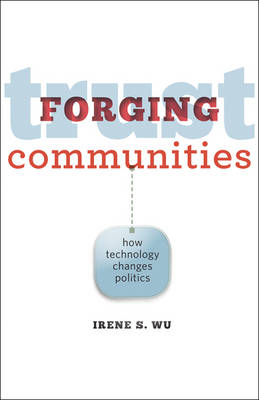
Forging Trust Communities
Johns Hopkins University Press (Verlag)
978-1-4214-1726-4 (ISBN)
In 1970, Taiwanese cable television gave voice to a political opposition demanding democracy. Both Qatar (in the 1990s) and Great Britain (in the 1930s) relied on public broadcasters to enhance their influence abroad. Additional case studies from Brazil, Egypt, the United States, Russia, India, the Philippines, and Tunisia reveal how various technologies function to create new political energy, enabling activists to challenge institutions while allowing governments to increase their power at home and abroad. Forging Trust Communities demonstrates that the way people receive and share information through network communities reveals as much about their political identity as their socioeconomic class, ethnicity, or religion. Scholars and students in political science, public administration, international studies, sociology, and the history of science and technology will find this to be an insightful and indispensable work.
Irene S. Wu is a senior analyst at the US Federal Communications Commission. The author of From Iron Fist to Invisible Hand: The Uneven Path of Telecommunications Reform in China, she teaches in the Communications, Culture & Technology Program at Georgetown University.
Acknowledgments
Part I
1. Trust Communities from the Telegraph to the Internet
Activists Use the Latest Technology Available
Governments Use Technology to Define the Nation
The Link between Commercial Success and Political Usefulness
Sharing and Interaction Create Meaning within a Trust Community
Trust Communities Can Have Diverse Members
Information as Political Currency
The Trust Community as an Analytical Tool
Unpacking the Concept of "Trust Community"
2. Blogs, Wikis, and International Collective Action
How This Case Came to Light
Failure of Government, Humanitarian, and Media Institutions
Why Individuals Came Together and How They Did It
Shock, Grief, and Anger
Frustration and the Impulse to Help
Creating the Blog and Wiki
Making the Blog Easier to Use
Creating the Wiki
Moving the Wiki to a New Home
The Egalitarian Ethos
Blog and Wiki Effectiveness on the Ground
Did Volunteers Participate Again in Other Collective Actions?
The View through the Lens of a Trust Community
Creating a Common Identity
Building Trust
Social Capital
Network
Trust Community
Institution
Part Two
3. Activists Challenge Institutions with Information Technology Networks
China 1900
Philippines 2001
Taiwan 1970s
Global 1990s
Egypt and Tunisia 2011
Conclusion
4. Governments Shape Nations with Communications Technology
Infrastructure and National Identity
Canada 1927
Brazill 1900
Discussion
Infrastructure, Economic Development, and National Security
China 1979
United States 1864
United States 1968
Information, Ideas, and National Security
USSR 1960
Russia 1880
Information, Ideas, and Delivering Public Services
Global 1990
United States 1960
Information, Ideas, and National Identity
India 1987
UK 1938
Qatar 1996
Discussion
Conclusion
Part III
5. Technology + Trust = Political Influence
Trust Communities — Opportunities for Individuals and Institutions
The Role of Capitalism
Engagement, Participation, and Interactivity
Trust Communities and Diversity
Information and Ideas as a Source of Power
Trust Community as an Analytical Lens
Future Research
Conclusion
Epilogue
For the Activist
For Businesses
For Governments
Notes
References
Index
| Zusatzinfo | 8 Line drawings, black and white; 2 Halftones, black and white |
|---|---|
| Verlagsort | Baltimore, MD |
| Sprache | englisch |
| Maße | 140 x 216 mm |
| Gewicht | 227 g |
| Themenwelt | Naturwissenschaften |
| Sozialwissenschaften ► Politik / Verwaltung ► Europäische / Internationale Politik | |
| Sozialwissenschaften ► Politik / Verwaltung ► Politische Theorie | |
| ISBN-10 | 1-4214-1726-X / 142141726X |
| ISBN-13 | 978-1-4214-1726-4 / 9781421417264 |
| Zustand | Neuware |
| Haben Sie eine Frage zum Produkt? |
aus dem Bereich


